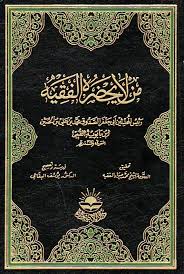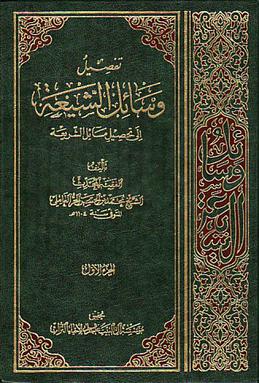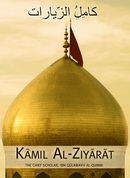Related Research Articles

Sahih al-Bukhari is the first hadith collection of the Six Books of Sunni Islam. Compiled by Islamic scholar al-Bukhari in the musannaf format, the work is valued by Muslims, alongside Sahih Muslim, as the most authentic after the Qur'an.

Bihar al-Anwar is a comprehensive collection of hadith compiled by Shia scholar Muhammad Baqir Majlisi. It is a hadith collection as the secondary source used beside the Four Books.

Abu 'Abd Allah Muhammad ibn Muhammad ibn al-Nu'man al-'Ukbari al-Baghdadi, known as al-Shaykh al-Mufid and Ibn al-Mu'allim, was a prominent Iraqi Twelver Shia theologian. His father was a teacher (mu'allim), hence the name Ibn al-Mu'allim. The title "al-Mufid" was given to him either by Muhammad al-Mahdi, the twelfth Shia Imam, or by al-Rummani, a Sunni scholar, after a conversation with him. The leader of the Shia community, he was a mutakallim, theologian, and Shia jurist.

Mohammad Baqer Majlesi, known as Allamah Majlesi or Majlesi Al-Thani, was an influential Iranian Akhbari Twelver Shia scholar and thinker during the Safavid era. He has been described as "one of the most powerful and influential Shi'a ulema of all time", whose "policies and actions reoriented Twelver Shia'ism in the direction that it was to develop from his day on."

Man lā Yaḥḍuruhu al-Faqīh is a Hadith collection by the famous Twelver Shia Hadith scholar Abu Jaʿfar Muḥammad ibn ʿAli ibn Babawayh al-Qummi, commonly known as Ibn Babawayh or Sheikh al-Saduq. This work is included among the Four Books of Twelver Shia Islam.
Shaykh Tusi, full name Abu Ja'far Muhammad ibn al-Hasan al-Tusi, known as Shaykh al-Ta'ifah was a prominent Persian scholar of the Twelver school of Shia Islam. He was known as the "sheikh of the sect ", author of two of the four main Shi'i books of hadith, Tahdhib al-Ahkam and al-Istibsar, and is believed to have founded the hawza. He is also one of the pioneering scholars of Shiite ʾUṣūl al-Fiqh and considered "a cardinal founder of ijtihad".

Abu Ja'far Muhammad ibn 'Ali ibn Babawayh al-Qummi, commonly referred to as Ibn Babawayh or al-Shaykh al-Saduq, was a Persian Shia Islamic scholar whose work, entitled Man La Yahduruhu al-Faqih, forms part of The Four Books of the Shia Hadith collection.

Wasa'il al-Shia is a reputable book of hadith in Shia Islam, compiled in the 17th century by Shaykh al-Hurr al-Amili. Shaykh Al-Hurr wrote two editions of this book, Ahl al-Bayt which is a 30 volume long edition of it, and Al-Islamiyyah which is 20 volumes long.

Al-Kafi is a hadith collection of the Twelver Shī‘ah tradition, compiled in the first half of the 10th century CE by Muḥammad ibn Yaʿqūb al-Kulaynī. It is one of the Four Books.
Badā' البَدَاء is a Twelver Shia Islamic concept regarding the Will of God. It refers to God revealing his will about a decision, wherein the people thought his will had already been made on that issue, as the Shia believe that God has knowledge of the ultimate outcome.
Uyoun Akhbar Al-Ridha, counted as a Hadith book among Shia, the book was written by Ibn Babawayh, one of the great scholars of Shia Muslims. The book concerned with saying and life of the eighth Shia Imam Ali al-Ridha.
Al-Amali means "book of dictations". The Al-Amali of Shaykh Saduq is a hadith collection by al-Shaykh al-Saduq, the shia jurist and theologian. Amālī or Majāles, recorded his regular Tuesday and Friday sessions in Nīšāpūr in 367-68/978-79. These dictations consist of miscellaneous traditions, but mostly accounts of the virtues of the Imams. These include the virtues and moral character of the household of Muhammad and moral exhortations.
Creeds of shia or Eʿteqādātal-Emāmīya is one of the most important works of al-Shaykh al-Saduq; it presents a summary of all of the core tenets of the Shi'ite creed.
Sorure Ahle Iman fi Alamat Zohour Sahab Al Zaman or Happiness of believers on the signs of Imam Mahdi' appearing was written on the subject of signs of Imam Mahdi the twelfth imam of Shiite by Ali ibn Abdul Karim Nili. The author narrated nearly one hundred and one narrations of ancestor's books. Some of these narrations are on the way of governing and periods of Imam Mahdi ruling.
Tuhaf al-Uqul is a hadith book written by Abu Muhammad al-Hasan bin Ali bin al-Husayn bin Shu’ba al-Harrani. He is one of the Shia Islam scholars in the fourth century of Hijrah.
Al-Nafs al-Zakiyyah, according to Shia Islamic eschatology, is one of the apocalyptic characters that Mahdi will send as his envoy to Mecca before his reappearance which will end the Major Occultation. He will be killed in Mecca and his death is one of the signs of the Mahdi in Shia Islam.
The voice from sky, according to Shia Islamic eschatology, will be words spoken by Jibrael which is one of the signs of Mahdi's appearance.

Kamil al-Ziyarat is a Hadith collection of 843 traditions, by the famous Twelver Shia Hadith scholar Abu al-Qasim Ja'far b. Muhammad b. Ja'far b. Musa b. Qulawayh a-Qummi al-Bahdadi, commonly known as Ibn Qulawayh.
Yaḥyā b. Abī l-Qāsim al-Asadī (d. 150 AH / 767 AD), known as Abū Baṣīr al-Asadī or simply Abu Basir was a Imami figure in Kufa. Abu Basir al-Asadi was in the company of Muhammad al-Baqir for a long time and after that he became one of the companions of Jafar al-Sadiq. Abu Basir's name is included in the number of six companions of al-Baqir and al-Sadiq that hadiths narrated by any one of them is considered authentic by many Shi'a scholars. Some consider Abu Basir al-Moradi as one of those six people instead of Abu Basir al-Asadi. A large number of religious and jurisprudential traditions in Imamiyyah hadith books, which were narrated from al-Sadiq through Abu Basir, show the extent of their association.Shaykh Tusi listed him among the companions of Musa al-Kadhim too. In addition to narrating from imams, Abu Basir al-Asadi has conveyed Hadiths narrated from some Imami narrators such as Abu Hamza al-Thumali and Saleh (Imran) ibn Maytham.
References
- ↑ "Introduction". 27 February 2013.
- ↑ Al-Khisal, the works of Sheikh Sadouq from the tongue of himself by Sayyed Hasan Fatemi, p. 74, the month book of religion
- ↑ Rhamati, Muhammad kazim, some points about importance of Sadouq works, p. 242, number: 30, 2002, scientific magazine of Hadith Sciences. pgs. 196-249